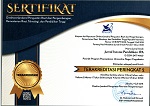PENGARUH INTERAKSI EDUKATIF TERHADAP KONSEP DIRI SISWA DALAM BELAJAR
Yunisca Nurmalisa
Abstract
This study aimed to explain the effect of educational interactions on students’ self-con- cept in studying at YP Unila Bandar Lampung High School. The method used a quantitative ap- proach with a descriptive design because the objectives and study were explained and described. Based on the existing analysis, it was found that 68% had an effect, this meant that educative interaction between students and teachers had an effect on self-concept, because if communication was built by teachers and students both students would not be reluctant or afraid to express their opinions to the teacher on the basis of self-concept good too. Meanwhile, it was also found that 72% of students had a good self-concept which meant the effect of changes that remained on their achievements would bring an attitude towards themselves. This also mean that the student’s self- concept could change if there are influences from other people who are trusted and that influence matches his will.
Keywords
educative interactions, communication, self-concept, learning, achievement
References
Arikunto, Suharsimi. 2006. Prosedur PenelitianSuatu Pendekatan Praktik. Jakarta: Rineka Cipta.
Jacinta F. Rini. 2002. Konsep Diri.http://www.e- psikologi.com. (07 April 2017)
Sadirman A.M. 2000. Interaksi Guru dan Anak Didik dalam Interaksi Edukatif. Jakarta: Rineka Cipta.
Sangadji dan Sopiah. 2010. Metodologi Penelitian. Yogyakarta: Andi
DOI:
http://dx.doi.org/10.17977/um019v3i2p215-219
Refbacks
There are currently no refbacks.
Copyright (c) 2018 Jurnal Ilmiah Pendidikan Pancasila dan Kewarganegaraan
This work is licensed under a
Creative Commons Attribution 4.0 International License .
<img src="/public/site/images/mujtaba/Logo_Dimensions24.PNG" alt="" data-mce-src="/public/site/images/mujtaba/Logo_Dimensions24.PNG" /><span id="mce_marker" data-mce-type="bookmark"></span><span id="__caret">_</span><img src="/public/site/images/mujtaba/Logo_Dimensions23.PNG" alt="" data-mce-src="/public/site/images/mujtaba/Logo_Dimensions23.PNG" /><span id="mce_marker" data-mce-type="bookmark"></span><span id="__caret">_</span><img src="/public/site/images/mujtaba/ms_academik2.jpg" alt="" data-mce-src="/public/site/images/mujtaba/ms_academik2.jpg" /><span id="mce_marker" data-mce-type="bookmark"></span><span id="__caret">_</span><img src="/public/site/images/mujtaba/Logo_Dimensions22.PNG" alt="" data-mce-src="/public/site/images/mujtaba/Logo_Dimensions22.PNG" /><span id="mce_marker" data-mce-type="bookmark"></span><span id="__caret">_</span><img src="/public/site/images/mujtaba/Logo_Dimensions21.PNG" alt="" data-mce-src="/public/site/images/mujtaba/Logo_Dimensions21.PNG" /><span id="mce_marker" data-mce-type="bookmark"></span><span id="__caret">_</span><img src="/public/site/images/mujtaba/googlescholar2.png" alt="" data-mce-src="/public/site/images/mujtaba/googlescholar2.png" /><span id="mce_marker" data-mce-type="bookmark"></span><span id="__caret">_</span><img src="/public/site/images/mujtaba/googlescholar1.png" alt="" data-mce-src="/public/site/images/mujtaba/googlescholar1.png" /><span id="mce_marker" data-mce-type="bookmark"></span><span id="__caret">_</span><img src="/public/site/images/mujtaba/Logo_Scholar4.JPG" alt="" data-mce-src="/public/site/images/mujtaba/Logo_Scholar4.JPG" /><span id="mce_marker" data-mce-type="bookmark"></span><span id="__caret">_</span><img src="/public/site/images/mujtaba/Logo_Dimensions2.PNG" alt="" data-mce-src="/public/site/images/mujtaba/Logo_Dimensions2.PNG" /><span id="mce_marker" data-mce-type="bookmark"></span><span id="__caret">_</span><img src="/public/site/images/mujtaba/Logo_Scholar3.JPG" alt="" data-mce-src="/public/site/images/mujtaba/Logo_Scholar3.JPG" /><span id="mce_marker" data-mce-type="bookmark"></span><span id="__caret">_</span><img src="/public/site/images/mujtaba/Logo_Scholar2.JPG" alt="" data-mce-src="/public/site/images/mujtaba/Logo_Scholar2.JPG" /><span id="mce_marker" data-mce-type="bookmark"></span><span id="__caret">_</span><img src="/public/site/images/mujtaba/Logo_Scholar1.JPG" alt="" data-mce-src="/public/site/images/mujtaba/Logo_Scholar1.JPG" /><span id="mce_marker" data-mce-type="bookmark"></span><span id="__caret">_</span><img src="/public/site/images/mujtaba/Logo_Scholar.JPG" alt="" data-mce-src="/public/site/images/mujtaba/Logo_Scholar.JPG" /><span id="mce_marker" data-mce-type="bookmark"></span><span id="__caret">_</span><img src="/public/site/images/mujtaba/Logo_Doaj.jpg" alt="" data-mce-src="/public/site/images/mujtaba/Logo_Doaj.jpg" /><span id="mce_marker" data-mce-type="bookmark"></span><span id="__caret">_</span><div class="statcounter"><a title="shopify analytics tool" href="http://statcounter.com/shopify/" target="_blank"><img class="statcounter" src="//c.statcounter.com/10941944/0/cdde6bf1/0/" alt="shopify analytics tool"></a></div>
<div class="statcounter"><a title="real time web analytics" href="https://statcounter.com/" target="_blank"><img class="statcounter" src="https://c.statcounter.com/12385990/0/fb523af2/0/" alt="real time web analytics"></a></div> View My Stats











